
Arthel Lane "Doc" Watson (March 3, 1923 – May 29, 2012) was an American guitarist, songwriter, and singer of bluegrass, folk, country, blues, and gospel music. Watson won seven Grammy awards as well as a Grammy Lifetime Achievement Award. Watson's fingerstyle and flatpicking skills, as well as his knowledge of traditional American music, were highly regarded.
Blind from a young age, he performed with his son, guitarist Merle Watson, for over 15 years until Merle's death in 1985 in an accident on the family farm.
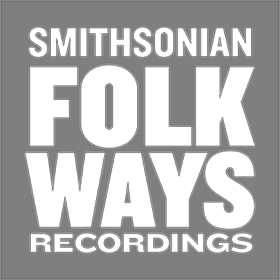 It’s hard to imagine a time when the brilliant guitar playing and Appalachian roots of Doc Watson weren’t a part of the American musical fabric. A famed artist in his day and a continuing influence on American music, Watson happened into the music industry much by accident, “discovered” by noted folklorist Ralph Rinzler in the early 1960s when he was mainly playing rockabilly tunes on the electric guitar near his home in tiny Deep Gap, North Carolina. Rinzler convinced Watson that audiences around the country were interested in the older music of Appalachia, and the nation soon fell in love with his heartfelt, powerful singing and his inimitable acoustic guitar playing. He inspired countless people to pick up the guitar and learn to flatpick the old melodies, much of this encouragement coming in person after performances. It was at the first of these shows in New York, really Watson’s first time headlining a show in the city (the previous time he’d played there he was one of two guitarists in Clarence Ashley’s band), that we get to hear this old music played by Watson and his fiddling father-in-law, Gaither Carlton. These live recordings from 1962 are to be released May 29, 2020, by Smithsonian Folkways as Doc Watson and Gaither Carlton on CD, digital, and vinyl. Most of these tracks have never been released before, and the recordings capture two masters at the height of their power, reveling in an audience that was there to listen, not just to drink and dance. It’s a moment where the rural Appalachian world of North Carolina came face to face with the urban New York world of young people desperate to learn folk music and to learn more about the Southern traditions they’d been discovering. These recordings show two very different worlds coming together, buoyed by Watson’s charming personality and his willingness to teach all who would learn.
It’s hard to imagine a time when the brilliant guitar playing and Appalachian roots of Doc Watson weren’t a part of the American musical fabric. A famed artist in his day and a continuing influence on American music, Watson happened into the music industry much by accident, “discovered” by noted folklorist Ralph Rinzler in the early 1960s when he was mainly playing rockabilly tunes on the electric guitar near his home in tiny Deep Gap, North Carolina. Rinzler convinced Watson that audiences around the country were interested in the older music of Appalachia, and the nation soon fell in love with his heartfelt, powerful singing and his inimitable acoustic guitar playing. He inspired countless people to pick up the guitar and learn to flatpick the old melodies, much of this encouragement coming in person after performances. It was at the first of these shows in New York, really Watson’s first time headlining a show in the city (the previous time he’d played there he was one of two guitarists in Clarence Ashley’s band), that we get to hear this old music played by Watson and his fiddling father-in-law, Gaither Carlton. These live recordings from 1962 are to be released May 29, 2020, by Smithsonian Folkways as Doc Watson and Gaither Carlton on CD, digital, and vinyl. Most of these tracks have never been released before, and the recordings capture two masters at the height of their power, reveling in an audience that was there to listen, not just to drink and dance. It’s a moment where the rural Appalachian world of North Carolina came face to face with the urban New York world of young people desperate to learn folk music and to learn more about the Southern traditions they’d been discovering. These recordings show two very different worlds coming together, buoyed by Watson’s charming personality and his willingness to teach all who would learn.
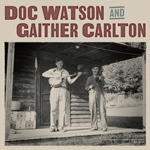 The music that Doc Watson and Gaither Carlton played on these recordings is not the powerhouse virtuosic guitar style Watson would later be known for; indeed he actually plays banjo on half the tracks. “This is family music with intricate interweaving of fiddle and guitar, or fiddle and banjo,” Siegel says. “This is the music that Doc and Gaither had been playing at home for the last twenty years. On this record you can hear the older stuff, you can hear flashes of brilliant guitar playing, but that’s not what the album is about.” Gaither Carlton was himself a fiddler of great power. His stately playing reflects the Scottish and Irish roots of the music, and he knew seminal old-time fiddlers from the 78rpm era, such as fiddler GB Grayson of Grayson & Whitter. Whereas Watson grew up in a household with a record player and access to the radio, later basing much of his music on songs he discovered over the airwaves, Carlton came from an older world and learned his music from his family and friends directly in his region of Appalachia. As Siegel says, “Gaither Carlton’s playing is a lot like his personality. He was very humble and soft-spoken. Now I listen to it again, I see he’s the soul of old-time music. He just brings out the essential quality of that music tradition.”
The music that Doc Watson and Gaither Carlton played on these recordings is not the powerhouse virtuosic guitar style Watson would later be known for; indeed he actually plays banjo on half the tracks. “This is family music with intricate interweaving of fiddle and guitar, or fiddle and banjo,” Siegel says. “This is the music that Doc and Gaither had been playing at home for the last twenty years. On this record you can hear the older stuff, you can hear flashes of brilliant guitar playing, but that’s not what the album is about.” Gaither Carlton was himself a fiddler of great power. His stately playing reflects the Scottish and Irish roots of the music, and he knew seminal old-time fiddlers from the 78rpm era, such as fiddler GB Grayson of Grayson & Whitter. Whereas Watson grew up in a household with a record player and access to the radio, later basing much of his music on songs he discovered over the airwaves, Carlton came from an older world and learned his music from his family and friends directly in his region of Appalachia. As Siegel says, “Gaither Carlton’s playing is a lot like his personality. He was very humble and soft-spoken. Now I listen to it again, I see he’s the soul of old-time music. He just brings out the essential quality of that music tradition.”
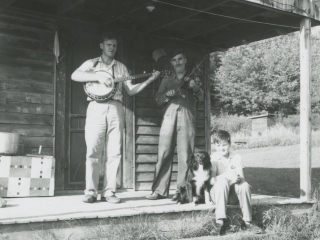
Watson was born in Deep Gap, North Carolina, United States. According to Watson on his three-CD biographical recording Legacy, he got the nickname "Doc" during a live radio broadcast when the announcer remarked that his given name Arthel was odd and he needed an easy nickname. A fan in the crowd shouted "Call him Doc!" presumably in reference to the literary character Sherlock Holmes's sidekick Doctor Watson. The name stuck.
An eye infection caused Doc Watson to lose his vision before his second birthday. He attended North Carolina's school for the visually impaired, the Governor Morehead School, in Raleigh, North Carolina.
In a 1989 radio interview with Terry Gross on the Fresh Air show on National Public Radio, Watson explained how he got his first guitar. His father told him that if he and his brother David chopped down all the small dead chestnut trees along the edge of their field, he could sell the wood to a tannery. Watson bought a $10 Stella guitar from Sears Roebuck with his earnings, while his brother bought a new suit. Later in that same interview, Watson explained that his first high-quality guitar was a Martin D-18.
Watson's earliest influences were country roots musicians and groups such as the Carter Family and Jimmie Rodgers. The first song he learned to play on the guitar was "When Roses Bloom in Dixieland", first recorded by the Carter Family in 1930. Watson stated in an interview with American Songwriter that, "Jimmie Rodgers was the first man that I started to claim as my favorite." Watson proved to be a natural musical talent and within months was performing on local street corners playing songs from the Delmore Brothers, Louvin Brothers, and Monroe Brothers alongside his brother Linny. By the time Watson reached adulthood, he had become a proficient acoustic and electric guitar player.
In 1953, Watson joined the Johnson City, Tennessee-based Jack Williams' country and western swing band on electric guitar. The band seldom had a fiddle player, but was often asked to play at square dances. Following the example of country guitarists Grady Martin and Hank Garland, Watson taught himself to play fiddle tunes on his Gibson Les Paul electric guitar. He later transferred the technique to acoustic guitar, and playing fiddle tunes became part of his signature sound. During his time with Jack Williams, Doc also supported his family as a piano tuner.
In 1960, as the American folk music revival grew, Watson took the advice of folk musicologist Ralph Rinzler and began playing acoustic guitar and banjo exclusively. That move ignited Watson's career when he played on his first recording, Old Time Music at Clarence Ashley's. Also of pivotal importance for his career was his February 11, 1961 appearance at P.S. 41 in Greenwich Village. He subsequently began to tour as a solo performer and appeared at universities and clubs like the Ash Grove in Los Angeles. Watson would eventually get his big break and rave reviews for his performance at the renowned Newport Folk Festival in Newport, Rhode Island in 1963. Watson recorded his first solo album in 1964 and began performing with his son Merle, the same year.
After the folk revival waned during the late 1960s, Watson's career was sustained by his performance of the Jimmy Driftwood song "Tennessee Stud" on the 1972 live album recording Will the Circle Be Unbroken. As popular as ever, Doc and Merle began playing as a trio with T. Michael Coleman on bass guitar in 1974. The trio toured the globe during the late seventies and early eighties, recording nearly fifteen albums between 1973 and 1985, and bringing Doc and Merle's unique blend of acoustic music to millions of new fans. In 1985, Merle died in a tractor accident on his family farm. Two years later Merle Fest was inaugurated in remembrance of him.
Watson played guitar in both flatpicking and fingerpicking style, but is best known for his flatpick work. His guitar playing skills, combined with his authenticity as a mountain musician, made him a highly influential figure during the folk music revival. Watson pioneered a fast and flashy bluegrass lead guitar style including fiddle tunes and crosspicking techniques which were adopted and extended by Clarence White, Tony Rice and many others. Watson was also an accomplished banjo player and sometimes accompanied himself on harmonica as well. Known also for his distinctive and rich baritone voice, Watson over the years developed a vast repertoire of mountain ballads, which he learned via the oral tradition of his home area in Deep Gap, North Carolina.
Watson played a Martin model D-18 guitar on his earliest recordings. In 1968, Watson began a relationship with Gallagher Guitars when he started playing their G-50 model. His first Gallagher, which Watson refers to as "Old Hoss", is on display at the Country Music Hall of Fame in Nashville, Tennessee. In 1974, Gallagher created a customized G-50 line to meet Watson's preferred specifications, which bears the Doc Watson name. In 1991, Gallagher customized a personal cutaway guitar for Watson that he played until his death and which he referred to as "Donald" in honor of Gallagher guitar's second generation proprietor and builder, Don Gallagher. For the last few years, Doc had been playing a Dana Bourgeois dreadnought given to him by Ricky Skaggs for his 80th birthday.
In 1994, Watson teamed up with musicians Randy Scruggs and Earl Scruggs to contribute the classic song "Keep on the Sunny Side" to the AIDS benefit album Red Hot + Country produced by the Red Hot Organization.
In his later life, Watson scaled back his touring schedule. Watson was generally joined onstage by his grandson (Merle's son) Richard, as well as longtime musical partners David Holt or Jack Lawrence. On June 19, 2007, Watson was accompanied by Australian guitar player Tommy Emmanuel at a concert at the Bass Performance Hall in Fort Worth, Texas. Watson also performed, accompanied by Holt and Richard, at the Hardly Strictly Bluegrass festival in San Francisco in 2009, as he had done in several previous years.
Watson hosted the annual MerleFest music festival held every April at Wilkes Community College in Wilkesboro, North Carolina. The festival features a vast array of acoustic style music focusing on the folk, bluegrass, blues and old-time music genres. It was named in honor of Merle Watson and is one of the most popular acoustic music festivals in the world, drawing over 70,000 music fans each year. The festival has continued after his death.
Watson was inducted into the North Carolina Music Hall of Fame in 2010.
In 1947, Doc married Rosa Lee Carlton, the daughter of popular fiddle player Gaither Carlton. Watson and Rosa Lee had two children – Eddy Merle (named after country music legends Eddy Arnold and Merle Travis) in 1949 and Nancy Ellen in 1951.
On April 29, 2012, Watson performed with the Nashville Bluegrass Band on the Creekside Stage at MerleFest. It was an annual tradition for Watson to join the Nashville Bluegrass Band for a gospel set on the festival's Sunday morning. It would be his final performance.
On May 21, 2012, Watson fell at his home. He was not seriously injured in the fall, but an underlying medical condition prompted surgery on his colon. Watson died on May 29, 2012 at Wake Forest Baptist Medical Center of complications following the surgery at the age of 89. He is buried in the Merle and Doc Watson Memorial Cemetery, Deep Gap, Watauga County, North Carolina, with his wife and son.
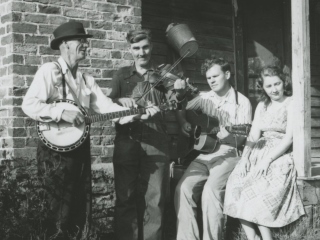
In 2002, High Windy Audio released a multi-CD biographical album titled Legacy. The collection features audio interviews with Watson interspersed with music, as well as a complete recording of a live performance at the Diana Wortham Theatre in Asheville, North Carolina. The collection won the 2002 Grammy Award for Best Traditional Folk Album.
In 2010, Blooming Twig Books published a comprehensive biography of Doc Watson, written by Kent Gustavson. The book, titled Blind But Now I See: The Biography of Music Legend Doc Watson, features never before published content regarding Watson's life and career, gleaned from interviews with Watson's friends and collaborators, including Norman Blake, Sam Bush, members of the Seeger family, Michelle Shocked and many others. The book also goes into detail on the life, supporting role and ultimate death of Merle Watson. An updated edition was released by Sumach-Red Books in March 2012.
In April 2013, Open Records released a multi-disc collection of unreleased recordings by Doc Watson. The collection, titled Milestones, features 94 songs as well as stories, remembrances, and over 500 photographs. The collection was created by Watson's daughter Nancy and is being produced by ETSU Bluegrass and ETSU professor Roy Andrade.
In 1986, Watson received the North Carolina Award and in 1994 he received a North Carolina Folk Heritage Award. He is a recipient of a 1988 National Heritage Fellowship awarded by the National Endowment for the Arts, which is the United States government's highest honor in the folk and traditional arts. In 2000, Watson was inducted into the International Bluegrass Music Hall of Honor in Owensboro, Kentucky. In 1997, Watson received the National Medal of Arts from U.S. president Bill Clinton. In 2010, he was awarded an honorary doctor of music degree from Berklee College of Music in Boston, Massachusetts.
A portion of the U.S. Route 421 near Deep Gap (Watson's birthplace) bears a sign reading, "Doc and Merle Watson Highway", dedicating it to Watson and his son.
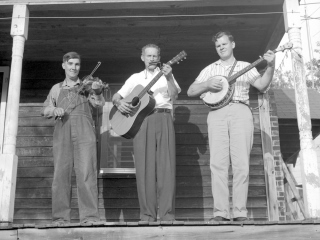
Gaither Wiley Carlton (February 3, 1901 – June 24, 1972) was an American Old-time fiddle player and banjo player. He is best known for his appearances accompanying his son-in-law Doc Watson during the folk music revival of the 1960s. While not recorded before the folk revival, Carlton had been playing with some of the region's most well-known musicians— such as Al Hopkins, G. B. Grayson, and Clarence Ashley— since the 1920s.
Carlton was born in Wilkes County, North Carolina in 1901. His father was an accomplished local musician, and the family often played at church events and other gatherings. In 1960, folk music producer Ralph Rinzler "rediscovered" Clarence Ashley at the Union Grove Fiddler's Convention, and offered to re-record Ashley at Ashley's home in Shouns, Tennessee. Ashley invited Carlton, Doc Watson (who was married to Carlton's daughter Rosa Lee Carlton), and several other bandmates to join in the sessions, which took place on Labor Day weekend in 1960. Carlton accompanied Watson and Ashley to a recording session in Saltville, Virginia the following year, and to subsequent recording sessions and folk festivals throughout the remainder of the decade. He died at his home in Deep Gap, North Carolina in 1972.
Carlton played banjo in the frailing style similar to Ashley. His fiddle style resembles that of his friend G.B. Grayson and Gid Tanner. His banjo recordings include "Rambling Hobo", which Rinzler described as reminiscent of Carlton's "peaceful, centered nature", and "Old Ruben", which he learned from his brother. His fiddle recordings include "I'm Going Back to Jericho", which he recalled learning from a neighbor, and "Handsome Molly", which he learned from G.B. Grayson. In 1961, Carlton played fiddle on a memorable recording of the traditional mountain tune "Hicks' Farewell", which Rinzler called "one of the most powerful pieces of recorded music I know."

Text is available under the Creative Commons Attribution-ShareAlike License.
Date: June 2020.
Photo Credits:
(1) Smithsonian Folkways,
(2ff) Doc Watson &
Gaither Carlton
(unknown/website).